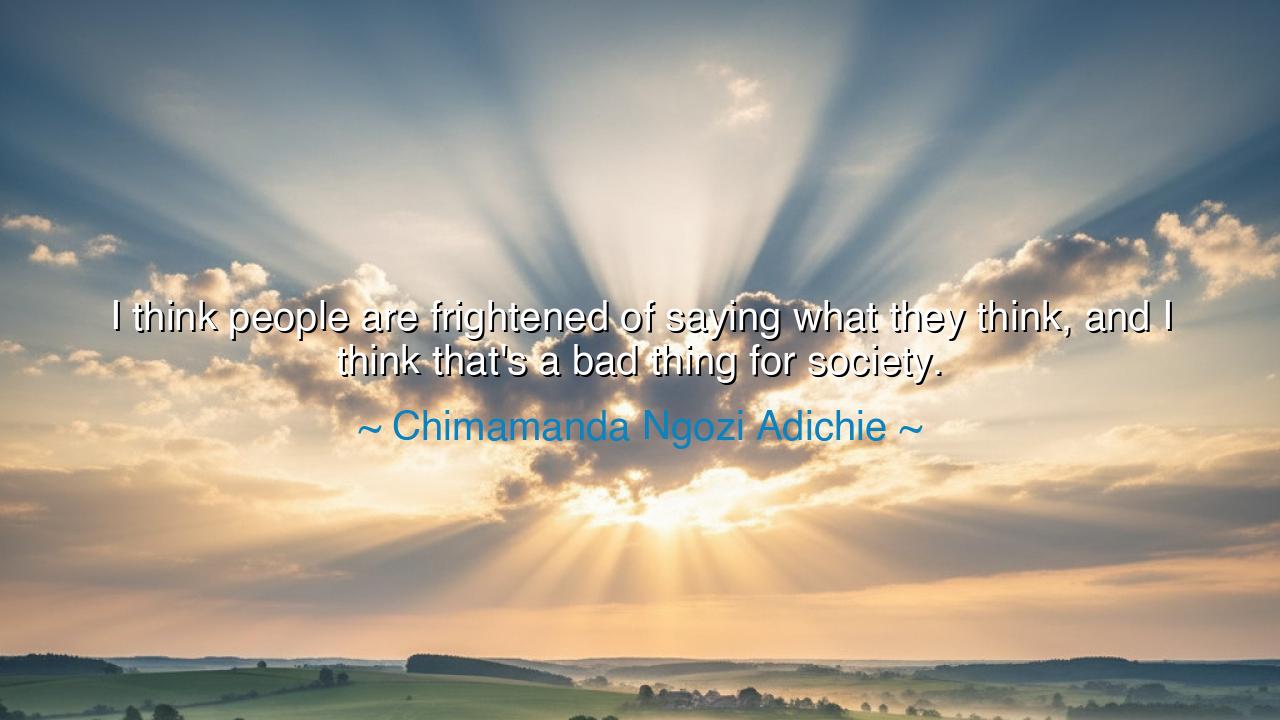
I think people are frightened of saying what they think, and I
I think people are frightened of saying what they think, and I think that's a bad thing for society.






Hear the voice of Chimamanda Ngozi Adichie, sharp as truth and tender as wisdom, when she declares: “I think people are frightened of saying what they think, and I think that’s a bad thing for society.” These words rise like a warning bell across the ages, for they remind us that silence in the face of fear is not safety but slow decay. A society where men and women dare not speak their thoughts is not alive—it is a hollow shell, dressed in the illusion of peace but corroded within by cowardice and repression.
When Adichie speaks of being frightened, she touches upon the chains we cannot see. These are not iron shackles, but the invisible bonds of judgment, censorship, and shame. People hold back their words not because their minds are empty, but because they fear the consequences—rejection by peers, punishment by authorities, condemnation by crowds. In such a world, truth withers, and only the safe, the shallow, and the false are spoken aloud. This is why she calls it a “bad thing”: for once fear silences the tongue, it soon silences the soul.
History testifies to this. Consider the time of Galileo, who saw with his own eyes that the earth moved around the sun. Yet he lived in a world where to say what he truly thought was dangerous. The Church silenced him, forcing him to whisper truth in the shadows. For centuries, humanity remained chained by fear, unable to embrace knowledge that would have set minds free. This is the curse of a society where people are too frightened to speak—it delays progress, it breeds falsehood, it denies humanity its rightful growth.
Or recall the darker days of apartheid in South Africa. The majority were bound by fear, too terrified to speak against the system that humiliated and crushed them daily. It was only when a few, like Nelson Mandela and Desmond Tutu, broke the silence, daring to say what they thought despite the threat of prison and death, that the walls of oppression began to crack. Their courage reminds us that the health of society depends not on silence, but on the unyielding voices of those who refuse to be cowed by fear.
The wisdom of Adichie’s words is that truth spoken is the lifeblood of freedom, while truth silenced is the root of tyranny. A people who no longer dare to say what they think become easy to control, for they have already surrendered their courage. Fear becomes their ruler, and conformity their creed. But when words are freed, even if they bring discomfort, even if they spark conflict, they open the path to understanding, change, and growth.
The lesson for us is clear: we must not let fear steal our voices. We must create a society where people are safe to disagree, to question, to challenge. Not all thoughts will be wise, not all words kind, yet the alternative—silence—is far worse. For without honest words, no true dialogue is possible, and without dialogue, no true progress can be made.
Therefore, O listener, let your actions be these: when fear grips your tongue, remember that silence serves only the oppressor. Speak your truth, even if your voice trembles. Defend the right of others to do the same, even when you disagree with them. Teach your children that free thought and free speech are not luxuries, but the pillars upon which every just society is built. And remember Adichie’s warning: a people too frightened to speak are a people already enslaved, but a people who dare to speak are a people who cannot be broken.






AAdministratorAdministrator
Welcome, honored guests. Please leave a comment, we will respond soon